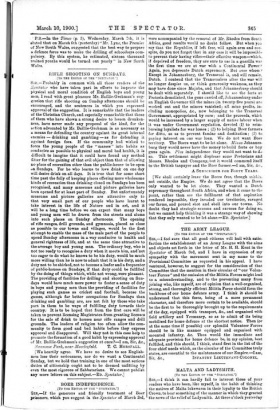RIFLE SHOOTING ON SUNDAYS.
[To THE EDITOR OF THE "SFECTATJP. '] SIE,—Probably in common with all those readers of the Spectator who have taken part in efforts to improve the physical and moral condition of English boys and young men, I read with great pleasure Mr. Baillie-Grohman's sug- gestion that rifle shooting on Sunday afternoons should be encouraged, and the sentences in which you expressed approval of the suggestion. It is remarkable that the leaders of the Christian Church, and especially remarkable that those of them who have shown a strong desire to lessen drunken- ness, have never made any proposal of the kind, for the action advocated by Mr. Baillie-Grohman is as necessary as a means for defending the country against its great internal enemies — drinking and gambling — as for defending it against foreign foes. If the community had wished to force the young people of the " masses " into habits as conducive as possible to physical and moral bad health, it is difficult to imagine that it could have found any method fitter for the gaining of that evil object than that of allowing no place of recreation other than the public-house to be open on Sundays. For he who learns to love drink on one day will desire drink on all days. It is true that for some short time past the folly of keeping places offering more wholesome kinds of recreation than drinking closed on Sundays has been recognised, and many museums and picture galleries have been opened for at least part of Sunday. But unfortunately museums and picture galleries are attractive only to that very small part of our people who have learnt to take interest in the life of Nature and in art, and it will be a long time before we can expect that many boys and young men will be drawn from the streets and slums into such places on Sunday afternoons. The opening of rifle ranges, drill grounds, and gymnasia, placed as close as possible to our towns and villages, would be the first attempt to enable the mass of the male part of the people to spend Sunday afternoons in a way conducive to health and general rightness of life, and at the same time attractive to the average boy and young man. The ordinary boy, who is not too ready to recognise a duty when it meets him, and'not too eager to do what he knows to be his duty, would be much more willing than he is now to admit that it is his duty, and a duty not to be shirked, not to become a loafer and a frequenter of public-houses on Sundays, if that duty could be fulfilled by the doing of things which, while not wrong, were pleasant. The providing of facilities for drilling and shooting on Sun- days would have much more power to foster a sense of duty in boys and young men than the providing of facilities for playing such games as cricket and football, because the games, although far better occupations for Sundays than drinking and gambling are, are not felt by those who take part in them to be ways of fulfilling duty towards their country. It is to be hoped that from the first care will be taken to prevent licensing Magistrates from granting licenses for the sale of drink to houses near rifle ranges and drill grounds. The leaders of religion too often allow the com- munity to form good and bad habits before they express approval and disapproval. Will they not in this case help to promote the formation of a good habit by expressing approval of Mr. Baillie-Grohman's suggestion at once ?—I am, Sir, &c., Swan scoe Park, near, 3facclesfie2d. T. C. HORSFALL.
[We heartily agree. We have no desire to see English- men lose their seriousness, nor do we want a Continental Sunday, but we hold that training in one of the most serious duties of citizenship ought not to be deemed unfitting by even the most rigorous of Sabbatariana. We cannot publish any more letters on this subject.—ED. Spectator.]






































 Previous page
Previous page